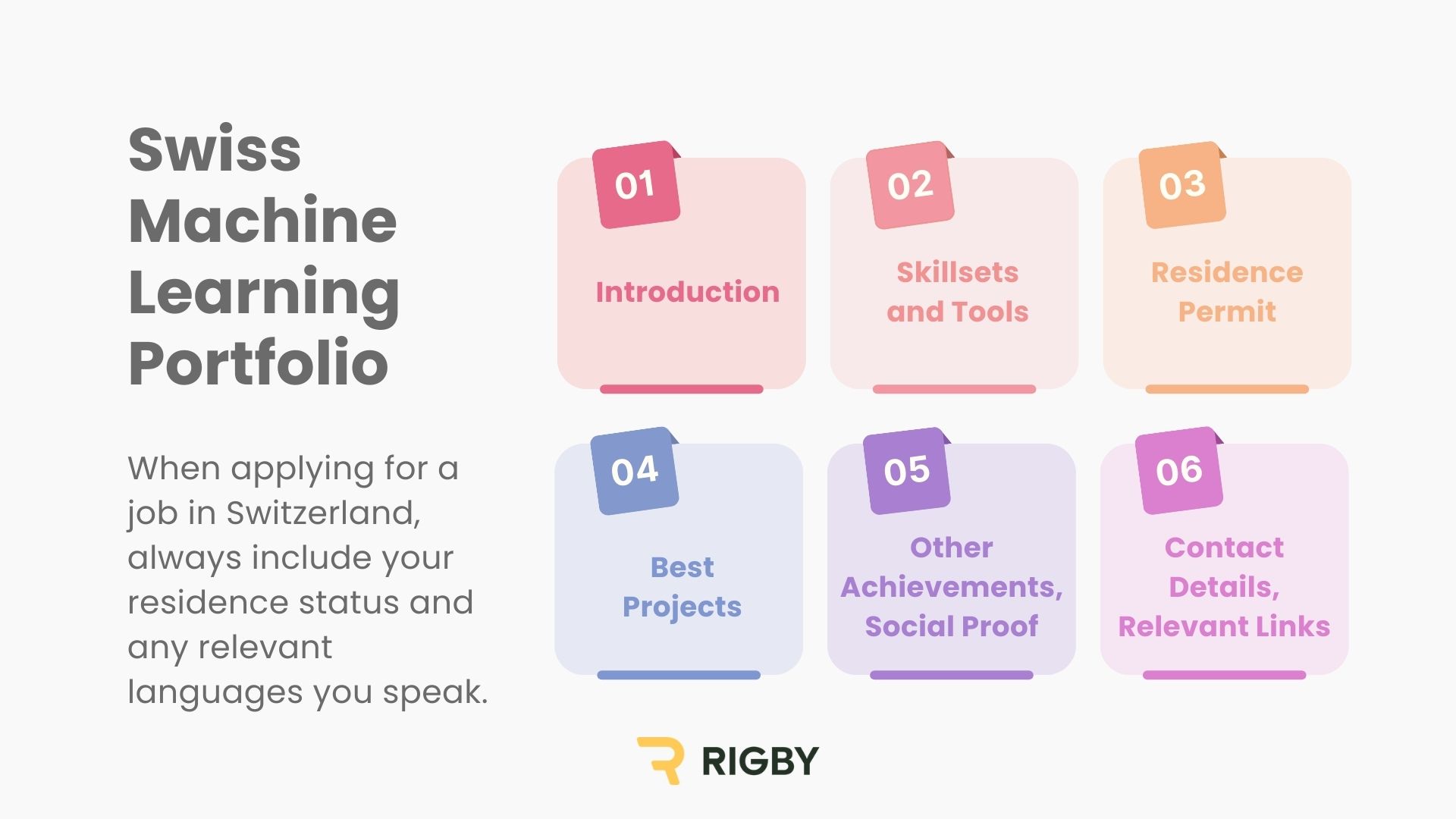How to Build a Strong Machine Learning Portfolio to Attract Swiss Employers
The AI job market in Switzerland is strong, and machine learning engineers are in high demand. Despite this, Swiss hiring managers can be selective about who they hire. To stand out from the crowd, you have to create a comprehensive and appealing machine learning portfolio.

What Is a Machine Learning Portfolio?
Although providing employers with a CV and your LinkedIn account is important, this isn’t enough to land a machine learning job. You’ll also need to showcase your experience in the form of past projects. This is where the machine learning portfolio comes in. It’s a compilation of your best work, designed to show employers how you’re capable of helping them develop new solutions. The portfolio helps hiring managers understand your skillset without having to seek information from multiple sources.
The Structure of a Good Portfolio
Your portfolio should be publicly accessible and easy to navigate. While some machine learning professionals create their entire portfolio on GitHub, others design their own websites. Both options can work well, so it’s down to personal preference.
Introduction
Start with one or two paragraphs about how you got into machine learning, why you are interested in it, and what current projects you’re working on. You may also want to include your related work experience and where you see yourself in the future.
Skillsets and Tools
Only write about the skills that are relevant to the position you would like. Limit yourself to a handful of skills, and provide some information to back up your claims. Explain what languages and frameworks you are able to use and what machine learning algorithms you know.
Residence Permit
Although certain employers may be happy to sponsor you, this is a challenging process. Most companies are more likely to consider your application if you already have a residence permit. Be clear about this in your application. Let employers know if you have:
- EU or EFTA citizenship
- A Swiss residence permit (B or C permit)
- A close Swiss relative or a Swiss spouse.
This will increase your chances of being considered for the job.
Contact Details
Make sure you include your name, email address, phone number, and LinkedIn page in your portfolio, so recruiters and hiring managers can get in touch with you easily. If you have machine-learning-related social media accounts, you can include them, as well.
Your Best Projects
At the core of your portfolio are your projects. If you have extensive machine learning experience, don’t list all the projects you’ve ever done. Think about which ones are most relevant for the AI job market in Switzerland. If you’re not sure, browse the LinkedIn profiles and websites of other machine learning experts working in the companies where you’re applying.
For each project, include:
- General information about the nature of the project and its importance
- The tools and methods you used and why you chose them
- The outcomes
- What you learned from the project
Although you can include unfinished projects, make sure you showcase several completed ones. This demonstrates that you can see projects through to the end.
Other Achievements and Social Proof
Don’t forget to display relevant achievements, such as courses you have completed, reports or articles you have published, conferences where you’ve presented your work, and volunteer work in a relevant field. If you’ve participated in any competitions, this is a good thing to mention. Competitions based on teamwork show potential employers that you’re good at collaboration.
Social proof is another element that could strengthen your portfolio. Include awards you’ve received and testimonials from former colleagues and superiors.
Relevant Links
If your profile isn’t already hosted on GitHub, this will be your most important link. Additionally, you can add links to any speeches you’ve done or articles you’ve written that are relevant to the job you’re applying for.

Choosing What to Include
When selecting your projects and achievements, think about the AI job market in Switzerland and the types of projects that are relevant for local companies. If you are applying for jobs in a specific industry, it’s always good to include at least one project that’s either related to the industry or where clear links can be made.
Another point to consider is the real-world impact of your projects. Whenever possible, use real, publicly accessible datasets instead of toy data, as this demonstrates that you can handle the complexity and inconsistency of real data. It also shows how you have developed practical skills.
The AI Job Market in Switzerland
Now could be a good time to find a machine learning job in Switzerland. The country is currently suffering from an acute labour shortage in the IT field. In our podcast, Serge Frech from the National Association of ICT Training discussed this problem and its implications for the job market. He stated that one of the solutions is to hire more people from abroad. Therefore, the number of jobs available to expats, even those who don’t speak the Swiss national languages, may increase in the next few years.
How to Attract Swiss Employers
Despite the labour shortage, Swiss employers can be selective when it comes to hiring IT professionals. Creating a high-quality machine learning portfolio is key. Make sure you focus on clarity and precision since these are important values in the Swiss working environment. If you have any skills that are specific to Switzerland, highlight them. This could be proficiency in French, German, or Italian or cultural sensitivity and experience working in different countries.
How to Find the Right Swiss Machine Learning Job
Landing a machine learning job in Switzerland is about more than creating a high-quality portfolio. You also have to find the right opportunities and make important connections. Networking is one of the best ways to get a job. Here are some effective strategies to try:
- Connect with other machine learning professionals in Switzerland online. Ask them about their experiences and recommendations.
- If you’re already in the area, attend events, both specific ones in your field and general professional networking events.
- Reach out to Swiss recruiters working in the IT industry. Sometimes, senior roles aren’t posted publicly, and you won’t find out about the position unless you work with a trusted recruiter.
The AI job market in Switzerland is strong, so now could be a good time to prepare your portfolio and apply. Get in touch with us at Rigby AG to find out about new AI and IT jobs in Switzerland. We’ll keep your CV on file and connect you with suitable opportunities.